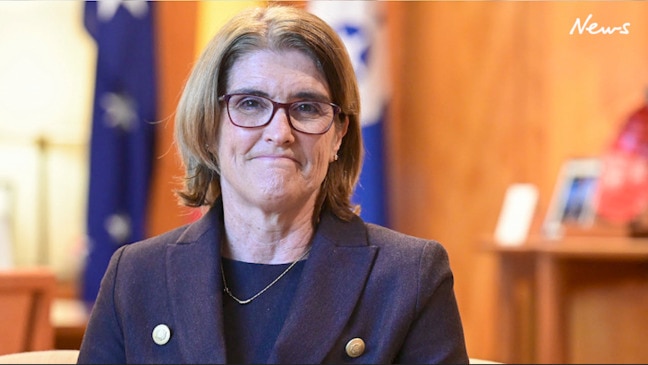Meet the RBA’s new governor Michele Bullock
The Reserve Bank of Australia will for the first time be led by a woman, veteran bureaucrat Michele Bullock.

Reserve Bank of Australia veteran Michele Bullock was revealed on Friday as the federal government’s chosen successor to governor Philip Lowe.
Prime Minister Anthony Albanese said Ms Bullock was “eminently qualified” for the top job amid an inflation crisis, which has led to interest rate rises and cost-of-living stress.
Treasurer Jim Chalmers, who joined Mr Albanese in making the announcement, said the decision to oust Dr Lowe was “not an easy call”.
Having been the public face of controversial rates rises aimed at tackling inflation, Dr Lowe’s dumping is a big change for homeowners.
Ms Bullock will inherit an RBA in the midst of a review and under fierce criticism when she takes over on September 18.
Who is Michele Bullock?
Ms Bullock was appointed RBA deputy governor in 2022, serving also as chief of the banks payment systems and executive women boards.
Like her predecessor, Ms Bullock has a long and storied history with the RBA, which she joined in 1985.

For the following 13 years she served in various roles in the Economic Group and International Department.
In 2007, she was appointed chief manager of the Payments Policy Department before becoming head of the department in 2010.
She went on to serve in a number of assistant governor roles within the RBA, including in currency, business, and finance system areas.
In total, Ms Bullock – who was born in Melbourne but grew up in Armidale in northern NSW – has 37 years of service with the RBA under her belt.
As for academia, she completed a Bachelor of Economics with honours at the University of New England (UNE).
Five years later, she also completed her masters at the London School of Economics in 1989.
In an interview with UNE, Ms Bullock described herself as a “country girl” and credited her regional upbringing with giving her perspective.
“Growing up in the country and going to UNE was a real leveller for me,” she said.
“There were country kids up there, some went to private schools in Sydney, a lot of them didn’t and went to public schools like me.
“It wasn’t about where you came from or who you were, it was about what you were contributing, like to the sporting teams you were playing in.

“It was a really welcoming environment.”
Ms Bullock told her former university it was that attitude that she wanted to bring to the RBA.
“I want to be inclusive, welcoming and make a level playing field upon which everyone can contribute,” she said.
“I think I bring that from my country upbringing.”
Where does she stand on rates?
The bad news for homeowners is Ms Bullock has so far shown little interest in altering the RBA’s current policy.
The Daily Mail reported Ms Bullock told an audience in Newcastle about combating inflation: “It might be easier to just jack up interest rates.”
Her comments came after 11-successive interest rates rises in just 12 months, the most rapid climb since 1989.
She told the Australian Industry Group the RBA’s aim of returning inflation – now at 6.8 per cent – back to the 2 to 3 per cent target by mid-2025 was lenient compared with other advanced economies, including the US.
“We are aiming to bring inflation back to target with a slightly longer period than countries overseas,” she said.
“In many ways, it might be much easier just to jack up rates because official cash rates equivalent overseas are higher than they are here.”
Ms Bullock said higher Australian interest rates would encourage people to save and reduce consumer inflation.

“As interest rates rise, people are incentivised to save more rather than consume, and that reduces demand,’ she said.
“It also keeps the exchange rate a bit higher, which means that imported inflation is lower.”
Ms Bullock also stressed higher interest rates were the only way of tackling inflation.
“It is our only tool; it works through a number of different mechanisms,’ she said.
“But, really, in bringing down inflation, that’s the only tool we have.”
Another goal for Ms Bullock during her tenure as RBA deputy was “full employment”.
At a speech at the Ai Group, Ms Bullock said it was “hard to overstate the importance” of achieving full employment.
“When someone cannot find work, or the hours of work they want, they suffer financially,” she said.
“The costs of unemployment and underemployment extend well beyond financial impacts.
“Unemployment – particularly long-term unemployment – can be detrimental to a person’s mental and physical health.”



